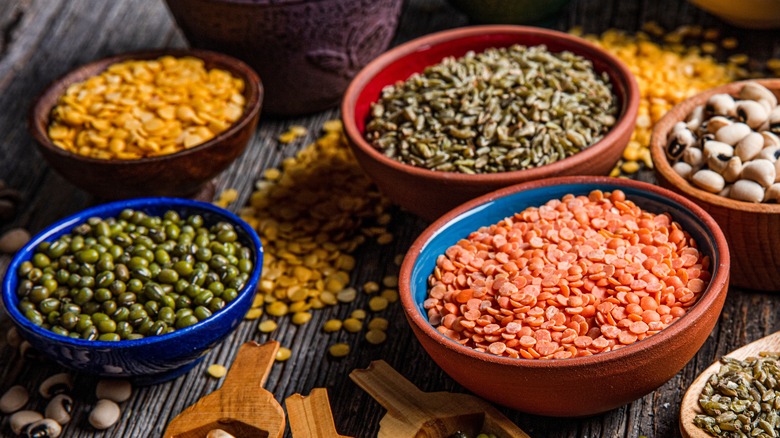Eat 3 Eggs Worth Of Protein With Just One Plant-Based Food
It's safe to say that the desire to seek out the best protein sources that aren't meat has become more prevalent with the popularity of vegan or vegetarian diets. Even those who include meat in their diets prefer variety sometimes, and while eggs are a good alternative source of protein to meat, there's a plant-based superfood that packs an equal punch as three whole eggs, per Business Insider.
A cup of lentils — the colorful variety of legumes dating as far back as 8000 B.C. — offers almost 18 grams of protein, per the U.S. Department of Agriculture. That's the amount you'd find in three whole eggs. These curved lens-shaped seeds come in a diverse range of hues (red, black, green, brown, yellow, and orange, to be specific), and although we might associate the food with Asia, Rome, or Egypt, Canada is the largest commercial producer of this plant-based delight, followed by India (via Harvard University).
It's not just protein that lentils can provide for you. They're packed full of other helpful nutrients like fiber, vitamins, folate, iron, and potassium.
What this plant-based food can do for you
For starters, lentils are a colorful and shelf-based alternative protein source. Proteins are often referred to as the building blocks of the human system, contributing to everything from hair, skin, and nail health to muscles, bones, and immunity. But it's also important to remember the other nutrients you need to think about if you're going plant-based. Unlike eggs, lentils aren't complete proteins, meaning they don't contain all the amino acids your body needs. Thus, make sure you're getting the other amino acids from sources like tofu and brown rice.
Nutritionist and certified personal trainer Jennifer Hanway shared that the fiber content in these legumes, particularly soluble fiber, promote a healthy digestive system (via Real Simple). "Soluble fiber dissolves in water to form a gel-like substance that moves through the GI system and can help remove some substances related to high cholesterol," she explained. The plant-based goodness of this food also includes antioxidant and anti-inflammatory properties, mainly owing to its content of polyphenols, per Healthline.
If you want to combat the risk of cardiovascular disease, lower your blood pressure, feel more energetic (courtesy of the iron content), or keep chronic diseases like cancer at bay, lentils can be a wonderful, not to mention easy and cost-effective, addition to your diet. The selenium content in this legume boosts the production of disease-killing T cells in your immune system, per Medical News Today.
Add them to stews or make them as they are
Lentils are a great thickening agent in stews and curries. The green kind goes well in stews and soups, while brown lentils (which are the most widely consumed kind) pair well with salad ingredients because of their earthy flavor (via Better Homes & Gardens). Both brown and black lentils hold their shape when they are cooked, so they could have more of a bite to them depending on how long you cook them.
Black lentils make good sources of protein when they're consumed as grains together with other nutritious ingredients. They are also rich in the antioxidant anthocyanin, a common compound in many purple and blue foods (via Real Simple).
When it comes to the yellow, orange, and red kinds, a great recipe is an Indian or Sri Lankan version of dhal. It's super easy to make. Just wash the lentils to get rid of impurities, set aside, and chop up some vegetables like onions, tomatoes, green chilies (if you like the dish spicy), and garlic. Toss the veggies in olive oil, add lentils, combine with a little bit of water, let them cook through, and finish off by adding some coconut or other plant-based milk (you can use dairy too). Stir the lentils through the cooking process to ensure they cook evenly, and don't let them sit on the fire for too long (unless you love eating them mushy, of course).



